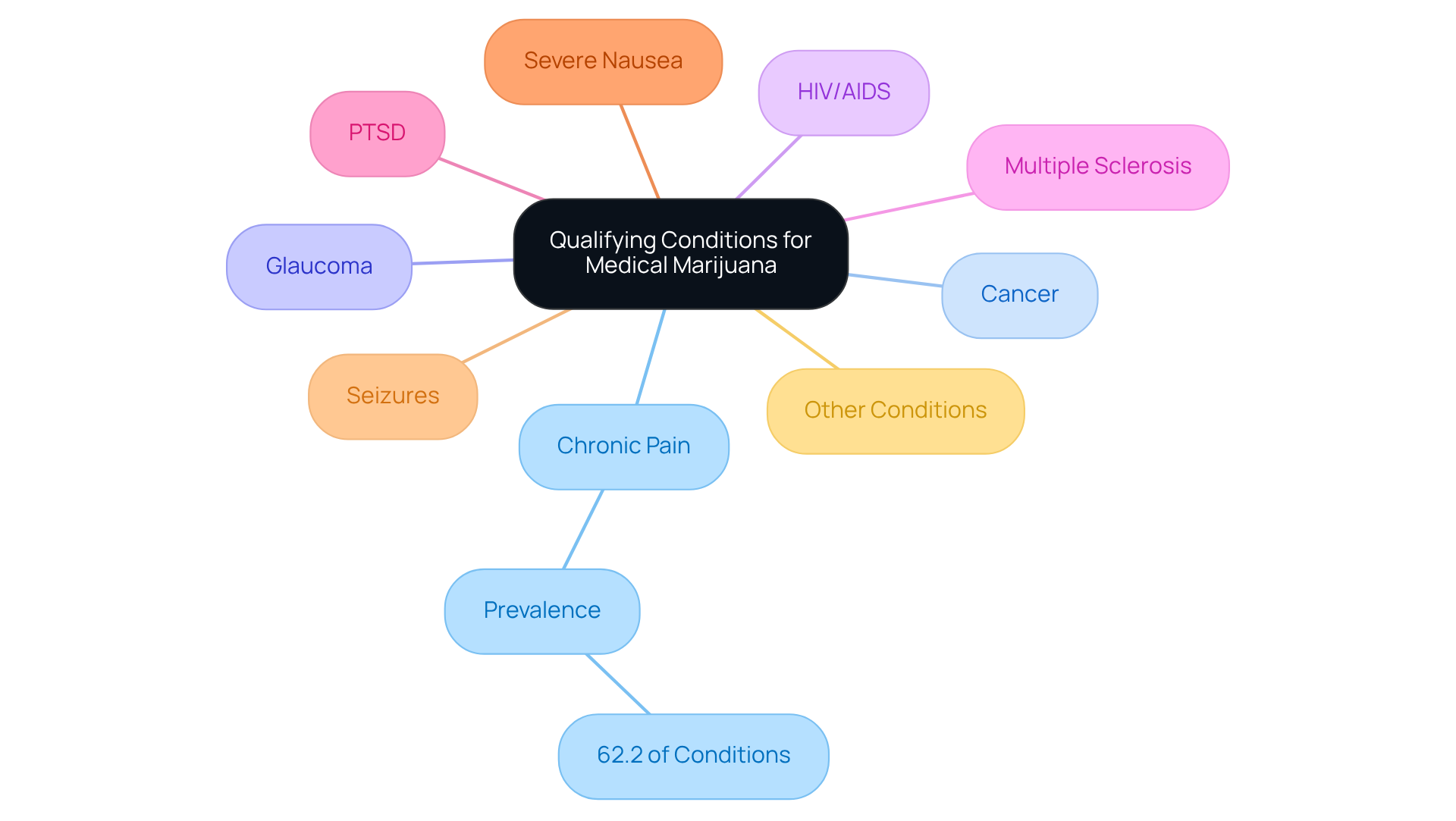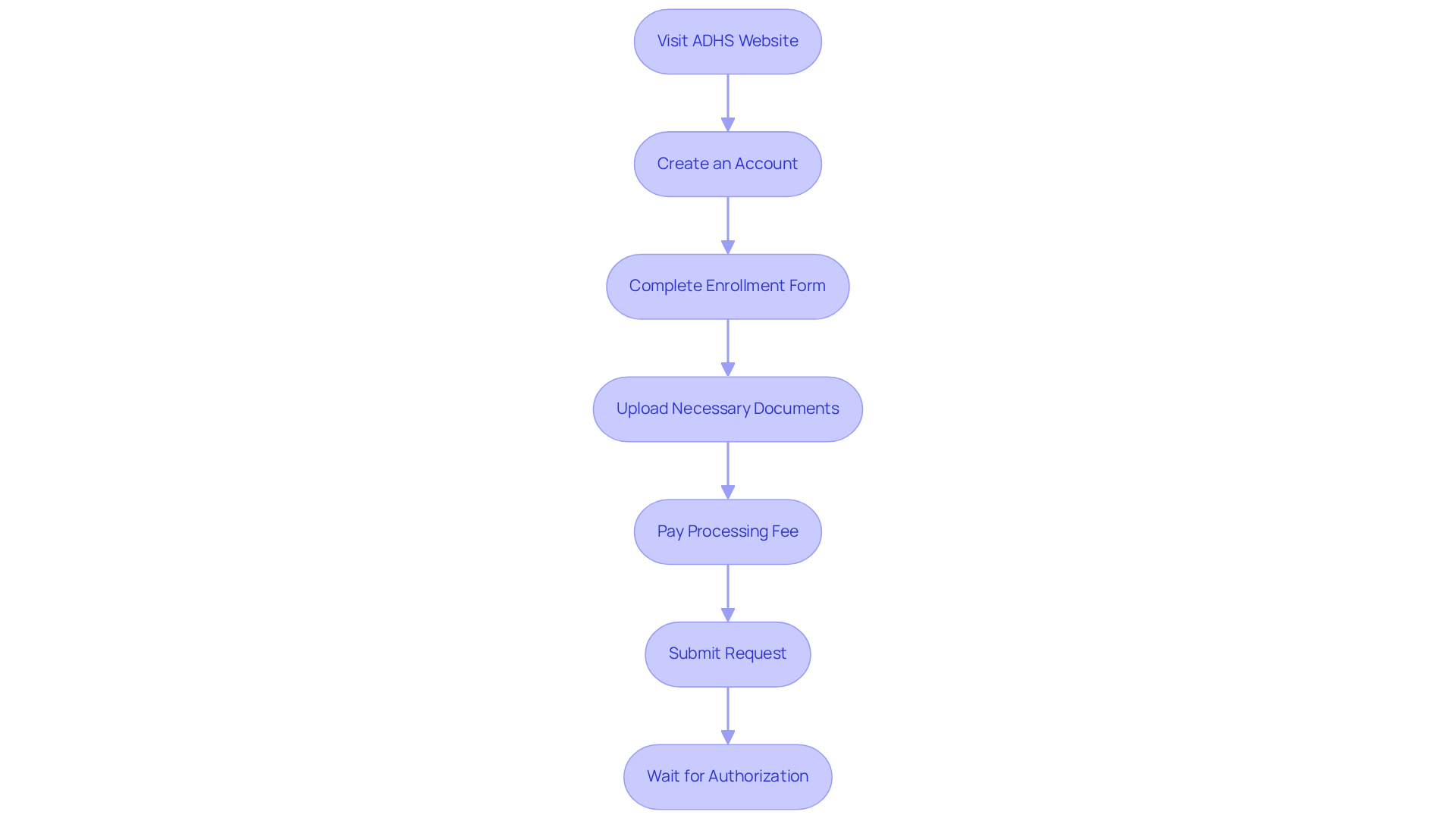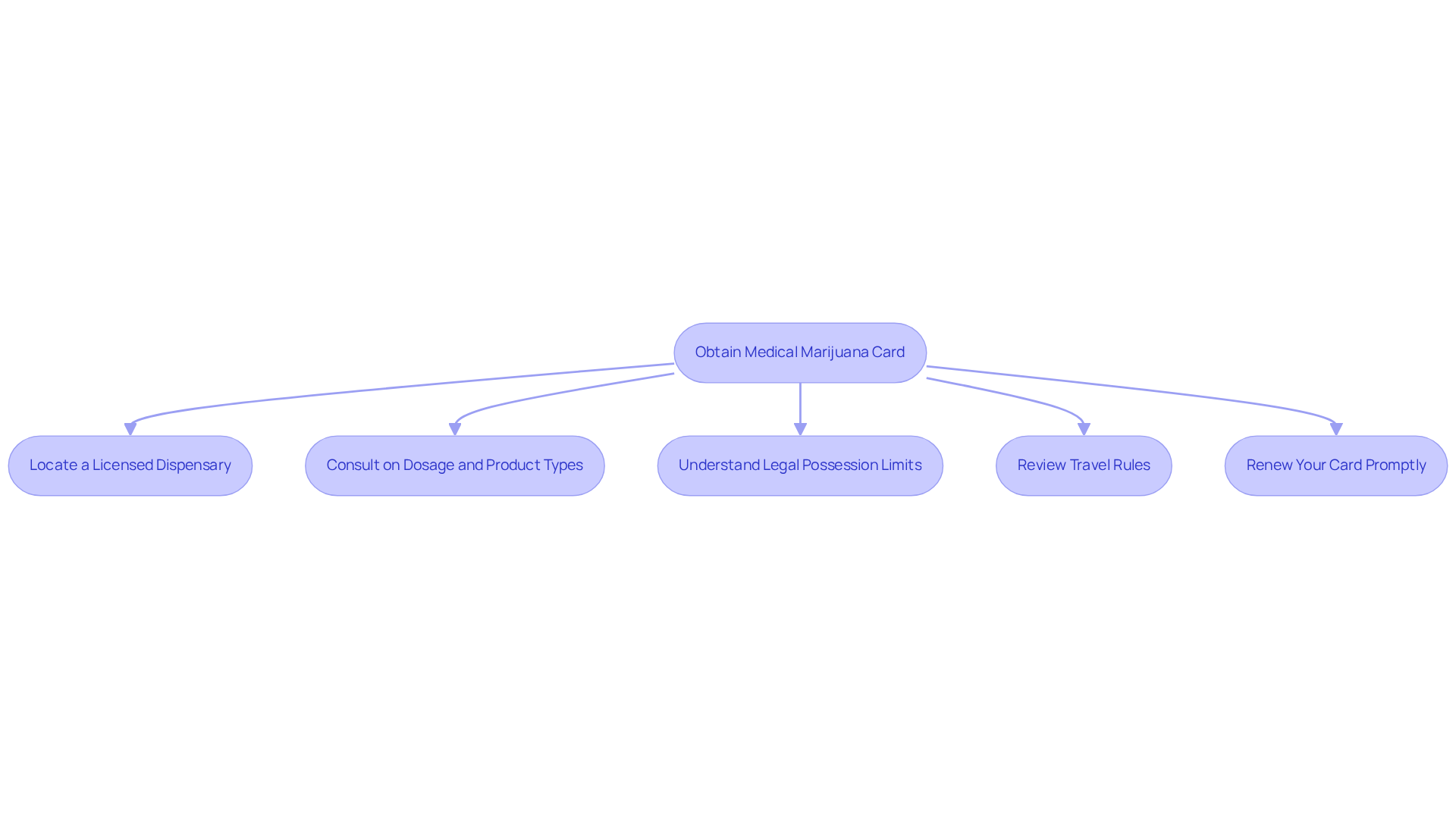3 Steps to Obtain Your Arizona Medical Marijuana Card
by Maya Green · July 25, 2025
Learn how to get your Arizona medical marijuana card in three easy steps.

Overview
If you’re considering obtaining your Arizona medical marijuana card, it’s essential to first recognize if you have a qualifying condition. This journey can feel overwhelming, but you’re not alone. Qualifying conditions, such as chronic pain and PTSD, are recognized, and understanding this is the first step toward relief.
The application process may seem daunting, but it’s designed to be straightforward. You’ll find a detailed step-by-step guide that emphasizes the importance of accuracy and adherence to legal limits for cannabis possession. It’s important to remember that taking these steps not only helps you navigate the process but also ensures that you can utilize your card responsibly.
As you move forward, be assured that each step you take is a step toward better health and well-being. We encourage you to approach this process with confidence, knowing that support is available every step of the way.
Introduction
Navigating the complexities of obtaining a medical marijuana card in Arizona can feel overwhelming, especially with the ever-changing landscape of cannabis legislation. This guide aims to provide a clear roadmap for individuals seeking relief through medical cannabis, outlining essential steps to help ensure a smooth application process.
As you embark on this journey, it’s natural to wonder: what specific qualifying conditions exist, and how can you effectively navigate the legal landscape to fully benefit from your medical marijuana card? Remember, you are not alone in this process, and we are here to support you every step of the way.
Identify Qualifying Conditions for Medical Marijuana
To acquire your Arizona medical marijuana card, the first step is to determine if you have a qualifying condition. Arizona law recognizes several medical conditions that may warrant the use of medical cannabis, including:
- Chronic pain
- Cancer
- Glaucoma
- HIV/AIDS
- Multiple sclerosis
- PTSD (Post-Traumatic Stress Disorder)
- Severe nausea
- Seizures
- Any other debilitating medical condition as determined by a licensed physician.
Chronic pain is particularly significant, representing about 62.2% of all patient-reported qualifying conditions for cannabis in the U.S. It’s important to acknowledge that approximately 100 million Americans indicate experiencing chronic pain, highlighting the essential role that cannabis plays in managing pain for many individuals. To confirm your eligibility, consider consulting with a healthcare provider experienced in cannabis. They can assess your health history and symptoms, helping you understand if you meet the criteria under the state’s regulations.
It’s important to remember that adult applicants must be 18 years or older to apply for an Arizona medical marijuana card. Possessing a qualifying condition is vital for advancing through the process of obtaining an Arizona medical marijuana card, as it establishes the groundwork for securing the necessary recommendations and approvals. Additionally, applicants must provide proof of residency in the state. Once your request is submitted, the Department of Health Services usually provides a cannabis card within two weeks after processing a complete request. Moreover, you may find that individuals can request the Department of Health Services to include more health conditions on the list of qualifying criteria, illustrating the evolving nature of the program. This flexibility can be reassuring as you navigate your options.
Complete the Application Process for Your Medical Marijuana Card
After verifying your qualifying condition, the next step is to finalize your cannabis identification card process. Here’s how you can navigate this important journey:
-
Visit the Arizona Department of Health Services (ADHS) website: Start by navigating to the ADHS marijuana program page to access the online form. This is your first step toward gaining access to the benefits of cannabis.
-
Create an account: If you’re new to this process, creating an account is essential. This will allow you to save your progress and return to the program later if needed, making it easier for you.
-
Complete the enrollment form: Take your time to supply all necessary information, including your personal details, health history, and the name of your certifying physician. It’s crucial that all information is accurate to avoid any delays. Remember, only licensed practitioners of medicine, osteopathic medicine, naturopathic medicine, and homeopathic medicine can provide certifications for cannabis in Arizona.
-
Upload necessary documents: You’ll need to submit proof of residency, such as a utility bill or lease agreement, along with a copy of your physician’s recommendation. This step is vital in ensuring your application is complete.
-
Pay the processing fee: The fee for a medical marijuana card in Arizona is typically $150, but if you participate in SNAP, you may qualify for a reduced fee of $75. This makes the process more accessible for low-income patients, which is an important consideration.
-
Submit your request: Before hitting submit, take a moment to review all information for accuracy and completeness. Once submitted, you should receive a confirmation email, providing peace of mind.
-
Wait for authorization: The ADHS usually processes requests within 14 business days, although many are managed within 24-48 hours. You can check the status of your request online through your account. It’s important to remember that your personal information is kept confidential and protected under HIPAA regulations, ensuring your privacy throughout this process.
By following these steps, you can effectively manage your application process and embrace the advantages of cannabis in your region. Remember, you are not alone in this journey, and support is available every step of the way.
Utilize Your Medical Marijuana Card: Access and Legal Considerations
Once you possess your state-issued marijuana card, you can begin accessing cannabis for therapeutic use. It’s important to remember that navigating this new journey can feel overwhelming, but you are not alone. Here are some essential points to keep in mind:
-
Locate a Licensed Dispensary: Use your card to buy cannabis from state-licensed dispensaries. As of April 2025, there are 136 licensed dispensaries in the state, and a comprehensive list is available on the Department of Health Services (ADHS) website. Finding the right dispensary can make a significant difference in your experience.
-
Consult on Dosage and Product Types: You may find that engaging with dispensary staff or your healthcare provider can help you identify the appropriate dosage and product types suited to your health requirements. Available options include oils, edibles, tinctures, and flower, each with varying effects and dosages. Remember, your comfort and health are the priority.
-
Understand Legal Possession Limits: State law allows patients to hold up to 2.5 ounces of usable cannabis every 14 days. Familiarizing yourself with these legal limits is crucial to avoid potential legal complications. It’s empowering to know your rights and responsibilities.
-
Review Travel Rules: If you intend to journey beyond the state, it’s vital to understand that although your health cannabis card is accepted locally, it might not be acknowledged in other areas. Always check local laws regarding cannabis for health purposes to ensure a smooth experience.
-
Renew Your Card Promptly: Medical cannabis cards in the state are valid for two years, but you can renew your card 90 days before expiration. Keep track of your renewal date and initiate the process early to ensure uninterrupted access to cannabis. Renewal fees vary by applicant type: $150 for adult patients, $75 for SNAP-eligible patients, and $200 for caregivers. Staying proactive will help you maintain your access without worry.
By adhering to these guidelines, you can effectively navigate the use of your Arizona medical marijuana card. This ensures safe and legal access to the benefits of medical cannabis with an Arizona medical marijuana card while being aware of your rights and protections under HIPAA. Remember, you are taking a positive step towards your well-being, and it’s okay to seek help along the way.
Conclusion
Obtaining an Arizona medical marijuana card is a straightforward process that can significantly enhance the quality of life for those facing qualifying medical conditions. By following the outlined steps—recognizing your condition, completing the application process, and effectively utilizing your card—you can access the therapeutic benefits of cannabis legally and safely.
It’s important to begin by understanding the qualifying conditions recognized by Arizona law, such as:
- Chronic pain
- Cancer
- PTSD
- Among others.
Once you confirm your eligibility, navigating the application process through the Arizona Department of Health Services becomes essential. Ensuring that all necessary documentation is submitted accurately will pave the way for approval. Once you receive your card, you will have access to licensed dispensaries and the opportunity to consult with professionals about suitable cannabis products tailored to your health needs.
In conclusion, acquiring an Arizona medical marijuana card not only facilitates access to essential health resources but also empowers you to take control of your wellness journey. By staying informed about legal considerations and renewal processes, you can make the most of your medical marijuana experience. Embracing this opportunity can lead to improved well-being and a better quality of life for those in need. Remember, you are not alone in this journey; support is available every step of the way.
Frequently Asked Questions
What are the qualifying conditions for obtaining a medical marijuana card in Arizona?
The qualifying conditions include chronic pain, cancer, glaucoma, HIV/AIDS, multiple sclerosis, PTSD (Post-Traumatic Stress Disorder), severe nausea, seizures, and any other debilitating medical condition as determined by a licensed physician.
How significant is chronic pain among the qualifying conditions for medical cannabis?
Chronic pain is particularly significant, representing about 62.2% of all patient-reported qualifying conditions for cannabis in the U.S. Approximately 100 million Americans report experiencing chronic pain, indicating the essential role of cannabis in pain management for many individuals.
How can I confirm my eligibility for a medical marijuana card?
To confirm your eligibility, consider consulting with a healthcare provider experienced in cannabis. They can assess your health history and symptoms to help determine if you meet the criteria under Arizona’s regulations.
What is the minimum age requirement to apply for an Arizona medical marijuana card?
Adult applicants must be 18 years or older to apply for an Arizona medical marijuana card.
What additional requirement must applicants fulfill besides having a qualifying condition?
Applicants must provide proof of residency in the state of Arizona.
How long does it typically take to receive a medical marijuana card after submitting a request?
Once your request is submitted, the Department of Health Services usually provides a cannabis card within two weeks after processing a complete request.
Can more health conditions be added to the list of qualifying criteria for medical marijuana in Arizona?
Yes, individuals can request the Department of Health Services to include more health conditions on the list of qualifying criteria, reflecting the evolving nature of the program.
Last Updated: July 24, 2025
Get Approved for Your Medical Marijuana Card in Minutes!

Get Your Medical Card
Connect with a licensed physician online in minutes

Like This Article?
Share with your friends
Table of Contents
Keep Reading
-
4 Steps to Get Your RI Medical Marijuanas Card Online
Easily apply for your RI medical marijuanas card online with our step-by-step guide.
-
Optimize Your Fitness Routine With Cannabis
Transform Your Fitness Regimen with Cannabis: Elevate Your Workouts to New Heights. Unleash the Power of Cannabis for Optimal Performance Today!
-
Supporting Digestive Health With Terpenes In Cannabis
Unlock the power of terpenes in cannabis to enhance your digestion! Learn how these natural compounds can revolutionize your gut health and start feeling amazing today. Click now for a healthier, happier you!






